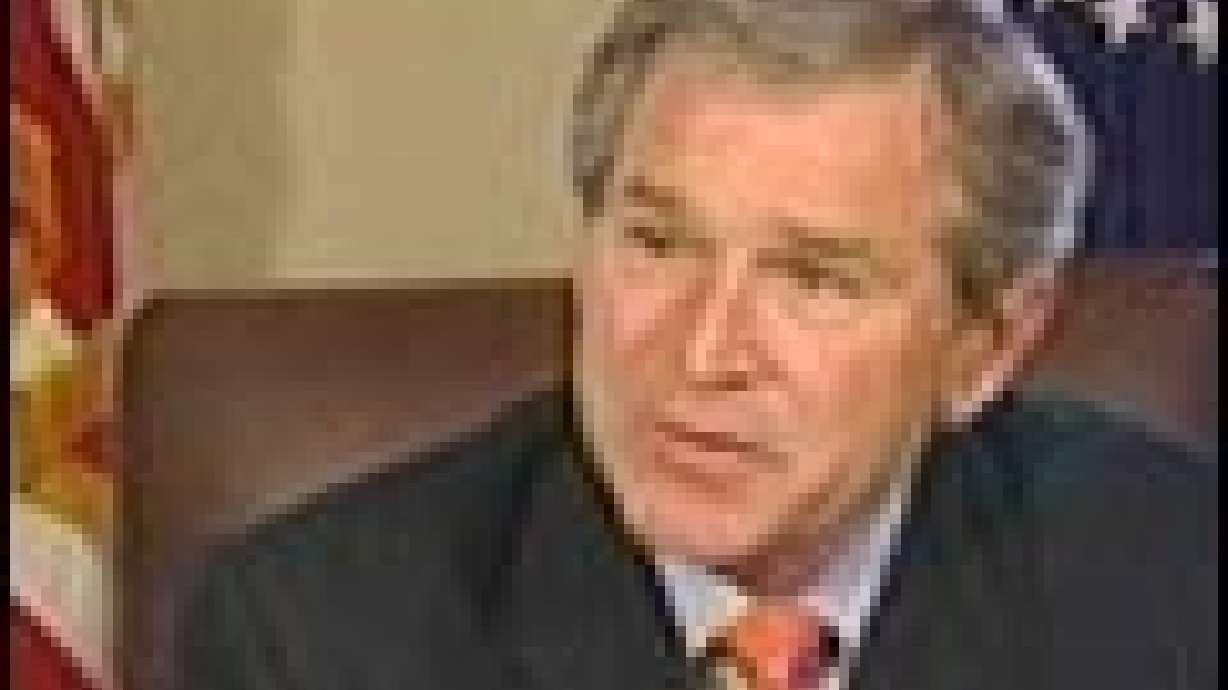Estimated read time: 4-5 minutes
This archived news story is available only for your personal, non-commercial use. Information in the story may be outdated or superseded by additional information. Reading or replaying the story in its archived form does not constitute a republication of the story.
WASHINGTON (AP) -- In a remarkably short time, the United States has radically shifted its policy in Iraq, opting to hand power quickly to an interim government that it hopes can mend sharp ethnic divides, calm a growing insurgency and serve as a democratic model for a volatile region.
But the new policy still leaves unanswered key questions that have bedeviled American efforts in Iraq, including how to create a new elected body without worsening tensions simmering between the majority Shiite population and the Sunni minority, which includes Saddam Hussein -- wherever he is. Not to mention how to end the U.S. occupation and eventually bring American soldiers home.
At first the Bush administration insisted on keeping a tight grip on power in Iraq, insisting that the Iraqi Governing Council write a constitution as a way to make sure that Iraqis put a truly democratic system in place. But the rising tide of violence -- the U.S. death toll topped 400 on Saturday -- and the fractured council's failure to get a constitution in the works, apparently forced the administration's hand.
In welcoming the plan to transfer power more quickly, President Bush was careful to note that it was announced not by the White House, but by the council itself in Iraq -- ironically on a day when two U.S. Black Hawk helicopters crashed, killing at least a dozen U.S. soldiers.
"The plan outlined by the governing council meets a key mutual objective of the coalition and the Iraqi people: the restoration of sovereignty to a body chosen by the citizens of Iraq and based in a legal framework," Bush said in a statement. "It also commits Iraq to a process for drafting a permanent, democratic constitution that protects the rights of all citizens."
It became clear in the past 10 days or so that a permanent constitution wasn't going to come together quickly, a senior White House official said. So Bremer rushed back to Washington for hastily scheduled meetings with Bush and his advisers. He told them what the Iraqis wanted, got input from the White House, then flew back to Iraq and got the council to sign on to the new plan.
Iraqi officials said the plan was what they had been pushing for all along.
Only a few weeks ago, Bremer and others were saying publicly that the Iraqi leaders on the governing council weren't politically mature enough to run the country. In late September, White House officials said that the Iraqis couldn't be trusted to decide how American reconstruction money should be spent.
Now, U.S. officials have decided that the Iraqis can do all that.
"They didn't think that the general Iraqi population would be so likely to lose faith in the U.S. effort," said Michael O'Hanlon of the liberal-leaning Brookings Institution.
"This is very much what the Iraqis and countries like France have been proposing now for months. It's not great that we're thinking of it now. It's not good that we're visibly changing our mind every month on what political strategy to follow, but it certainly is in my opinion the best strategy we now have available to us."
Yet, even as a senior White House official hailed the agreement as a "milestone" on Iraq's path to democracy, it remains unclear exactly how delegates to this new provisional government will be chosen in town hall-style meetings across the wartorn nation.
"This is going to be, now, the hard work -- to figure out exactly how these town halls will work," the official said.
Critics of the administration's Iraq policy contend that accelerating the transfer of power is being driven by American politics and a president facing re-election who wants to show more progress in Iraq. But the White House said the administration has always wanted to transfer authority as soon as possible.
The key to the new U.S. plan will be figuring out a way to create a new elected body without worsening the ethnic tensions that are simmering and could worsen -- especially between Sunnis and majority Shiites, said Anthony Cordesman, a Middle East expert at the Center for Strategic and International Studies who recently returned from Iraq.
That could prove tricky because the country has no experienced leadership among those Iraqis who stayed in the country during Saddam's regime, and exile leaders like Ahmad Chalabi still lack any practical experience at governing and have big personal ambitions, Cordesman noted.
While Sunis and Shiites get along in some areas, ethnic divides have come up and the Sunnis -- including Saddam -- face a loss of power and privilege that may be difficult for them to tolerate, Cordesman said.
Moreover, there will be a natural desire in parts of the country to push to make the country's government more Islamic now that freedom is in sight, Cordesman said -- something that could prove troubling to the United States, which is leery of meddling by Iran's fundamentalist Islamic government next door.
(Copyright 2003 by The Associated Press. All Rights Reserved.)








